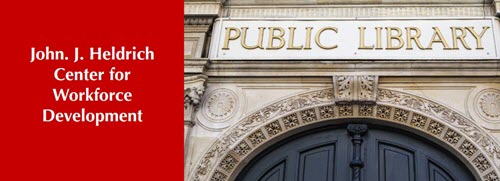Report on Public Libraries: A Community's Connection for Career Services
 This September 3, 2019 press release is republished courtesy of John J. Heldrich Center for Workforce Development, Rutgers University.
This September 3, 2019 press release is republished courtesy of John J. Heldrich Center for Workforce Development, Rutgers University.
Local public libraries serve an important role in the national workforce development system. This role has increased since the Great Recession and became formalized through changes in the Workforce Innovation and Opportunity Act of 2014. Public libraries offer a range of career services, including résumé and cover letter support, job application assistance, interview preparation, training, and referrals to American Job Centers/other support services. A recent study from the Heldrich Center for Workforce Development chronicles the extent to which public libraries across the United States are providing these career services.
Researchers used three strategies to address the research questions for this study: a literature review and data collection from library websites, a national survey of state library staff that included open-ended responses, and structured telephone interviews with local library staff. The research team used descriptive statistics and rigorous qualitative coding methods to analyze the data. While data are not nationally representative, researchers collected data from 42 states.
Findings from the study report, written by Stephanie Holcomb, Amy Dunford, and Fopefoluwa Idowu, include:
- Seventy-five percent (75%) of survey respondents reported that libraries in their state provide career services. Most library staff respondents describe a strong demand for career services; for some, demand has slowed with the improving economy, but for a few, the demand has increased.
- Respondents reported that public libraries are regarded as accessible alternatives to traditional workforce service providers due to their flexibility, accessibility, and openness to all patrons. However, library staff reported that not all community members and potential partners are aware that libraries play a role in the workforce system.
- Survey respondents noted that their public libraries have partnerships with nonprofit organizations (79%), One-Stop Career Centers/American Job Centers (69%), and community colleges or universities (69%).
- Respondents noted that the lack of funding affects programming. Among other challenges, this leads to variation in what libraries can offer, with some providing formal workforce development programming and others offering informal job search support.
Given the local focus of individual public libraries, future research should include staff from all local libraries to better assess the variation of demand and services provided at the local level. Future research should also include patrons and community partners to provide insight from multiple stakeholder perspectives on how libraries may be better able to meet the needs of patrons and the national workforce system.
